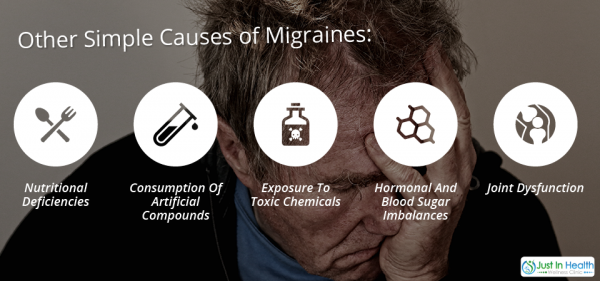Are Your Migraines Caused by the Food You Eat?

By Dr. Justin Marchegiani
The food you eat on a daily basis has a profound effect on your body’s inflammation level. The more inflamed you are, the faster your body breaks down. The faster your body breaks down, the more you suffer from pain, fatigue, headaches, hormonal issues, and other problems commonly attributed to ageing. On the flip side, the more you are putting your body into an anti-inflammatory state, the easier it is for your body to heal and perform at the highest levels possible.
Consuming gluten is strongly linked to migraine headaches. Gluten has been shown to cause a decrease in cerebral blood flow: the blood flowing to your brain. The main role of cerebral blood is to carry oxygen and nutrition to the brain for fuel so it can perform and thrive in its daily activities. When the brain isn’t being fed, migraine headaches can occur (1).
Imagine crossing your legs for 2-3 hours. Do you remember that pins-and-needles feeling you get when your leg hasn’t received enough blood? Now imagine getting up and running across the room— you’re likely to trip and fall. A similar thing happens to your brain when having cereal for breakfast, pizza for lunch, and pasta for dinner. Except instead of a pins-and-needles sensation causing your legs to go wobbly, you get a killer migraine headache that makes driving, taking a test, working, and other daily functions very difficult. A diet high in gluten is likely to cause chronic headaches and oftentimes migraines too, which severely limits your performance and your potential.
Click here to know about the possible causes of your migraines.

Other Simple Causes of Migraines:
- Nutritional Deficiencies: Gut inflammation is caused by common food allergens, such as grains, dairy, and legumes. These common allergens are notorious for preventing important nutrients like iron, calcium, selenium, magnesium and vitamin C from being absorbed. These nutrients are important for everyday health functions and healthy blood flow to the brain.
- Consumption of artificial compounds: Aspartame, Splenda and MSG (monosodium glutamate) are known excitotoxins. Excitotoxins are chemicals that stimulate neurons in the brain to the point that they are destroyed; this is not a good thing! Research from Russell Blaylock MD, a renowned neurosurgeon has elaborated on this phenomenon in his book Excitotoxins: The Taste That Kills. These compounds are commonly found in fast food and soda.
- Exposure to toxic chemicals: Personal care and cleaning products can cause serious damage to your health, and are a common cause of migraine headaches too. I recommend all of my patients to thoroughly examine the ingredients in their household cleaners, perfumes, dryer sheets, makeup, and shampoos. The Environmental Working Group has compiled an excellent database where you can personally look up the products you use and the level of toxicity is graded on a scale of 1-10 (10 being the worst). Whole Foods and other natural grocery store are a great place to find non-toxic alternatives.
- Hormonal and Blood Sugar Imbalances: These can cause migraines in some females. These hormonal imbalances can be attributed to blood sugar disturbances, or the ebbs and flows in progesterone or estrogen that occur throughout the monthly menstrual cycle. Getting an adrenal-cortisol rhythm or monthly females hormone salivary lab test can help assess if this is the cause of your migraines.
- Joint Dysfunction: Any time the joints in your body—especially the joints in your neck and the upper cervical spine—aren’t moving properly, migraine headaches can occur. Getting your neck assessed by a good chiropractor can help you determine whether your joints are the root cause of your headaches.
Having frequent migraines? Click here to find out if it is related to your food intake.
References:
- American Journal of Gastroenterology, Vol.98, No.3 2003, 626-9.


